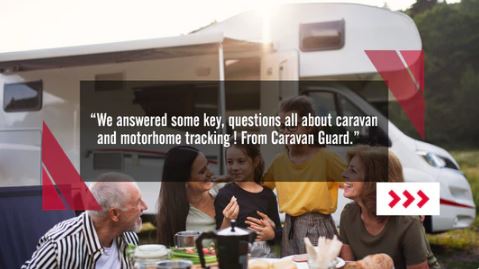 Add My Company
Add My Company
We answered some key questions, all about caravan and motorhome tracking! From Caravan Guard.

Tracking devices have become standard in many new leisure vehicles, and numerous caravan and motorhome owners are investing in aftermarket options to safeguard their prized possessions. In the event of theft, a tracking device can facilitate the swift location and recovery of your vehicle. Additionally, having an approved tracking device can lead to significant discounts on your caravan or motorhome insurance policy.

In this video, we chat with Laura Wilson from Moving Intelligence about tracking devices for caravans and motorhomes. She explains how these devices work, the various types available for leisure vehicles, and the different Thatcham categories. Additionally, she addresses common questions about tracking devices and the theft recovery process.
Q: What is a tracking device?
A tracking device is installed in a leisure vehicle to relay its location to an online central portal. It can be activated in various ways, such as through an alarm or by receiving an alert if the vehicle moves outside a designated area. You can also request the device's current location, often via an app.
After installing a tracking device, you need to pay an ongoing subscription to the tracking device company. This subscription grants access to their online portal and services that track your leisure vehicle’s position, as well as their 24-hour contact center to assist with theft recovery. The subscription often covers a multi-network SIM card, enabling the device to transmit its location, time, and past movements.

Q: What are the different types of tracking devices?
Tracking device solutions are typically divided into two categories: proactive tracking systems and reactive tracking systems.
A reactive tracking system requires the customer to notify their tracking device provider when their caravan or motorhome has been stolen. The provider then takes action to locate and recover the stolen vehicle.
In contrast, a proactive tracking system automatically sends alerts to the user.
“That alert can be triggered in a number of different ways,” explained Laura. “It could be a movement alert, a tilt alert, or a low battery notification. This alert is sent to the customer proactively.”
For motorhomes or campervans equipped with a Thatcham S5 tracking device, an alert is triggered if a wireless ADR (Automatic Driver Recognition) tag is not present when the vehicle is moved.

“So if, for example, a vehicle is stolen without the tag, an alert is triggered, and the customer will receive a phone call asking 'the tags aren’t present, is everything okay?' This notifies them of a possible theft or unauthorised movement,” said Laura. “The customer can opt to take it a step further, and if the tags aren’t present, the vehicle can be immobilised.”
“The benefits of having a proactive system are that you’re notified immediately, rather than having to wait. For example, if a caravan or motorhome is in storage, it could take weeks or even months to discover that the vehicle has been stolen. With proactive alerts, you are informed right away.”
In addition to wired-in proactive and reactive tracking systems, there are also battery-operated tracking devices.
“Battery-operated units are perfect for after-theft recovery solutions,” said Laura. “They can be fitted onto any asset, even those without power.”

The battery-operated devices from Moving Intelligence operate on a 'wake-sleep' cycle, reporting their location once a day before going back to sleep.
“While they’re asleep, they’re virtually undetectable to thieves,” said Laura. “In the event of a theft, we send a message to the unit to wake up more frequently, providing location updates at shorter intervals.”
Laura highlighted that the advantage of battery-operated devices in leisure vehicles is their wireless nature, allowing them to be installed in various hidden locations.
Moving Intelligence also offers the Sentinel range, which combines a tracking system with an alarm.
“The benefit of this setup is that you receive more proactive alerts through the tracking portal when the alarm system is triggered. For those who store their leisure vehicles over the winter, being alerted when the alarm is activated ensures they are aware of any issues, rather than the alarm going off unnoticed in a storage yard.”

What are the different Thatcham categories?
Thatcham subjects tracking devices to a rigorous testing process, awarding certifications upon completion. These certifications ensure the functionality, design, and performance of alarms, immobilisers, and tracking systems.
Category S7
At least one means of signal transmission
Battery backup power supply
Health check program
Capability to locate the asset within a 1-mile radius in general terrain
Passively or actively set function
Precisely locatable within 15 minutes of signal receipt during the Thatcham pursuit test
Remote set function
Resistance to attack for a minimum of two minutes
Category S5
“The main difference between S5 and S7 is the ADR (Automatic Driver Recognition) tags,” said Laura. “S5 is the ultimate solution with the added benefit of theft prevention.”

Caravan and motorhome insurance companies often require your tracking device to be Thatcham approved to qualify for a premium discount. For high-value motorhomes, campervans, or caravans, fitting an approved device may be a condition of coverage.
Depending on the value of your vehicle, you may need to fit a Thatcham S7 tracking device or a more advanced Thatcham S5 device.

How does the recovery process work?
When a customer becomes aware of a theft, they should notify the police and obtain a crime reference number. This number is then communicated to their tracking device company’s call center, which provides support to both the customer and the police to recover the stolen leisure vehicle.
Depending on the type of tracking device, the company can obtain a GPS position. For wired-in devices, this should provide immediate details of the vehicle's location and movements.
For battery-operated devices, it may require waiting for the next wake-up cycle to get a position. Once available, this information is relayed to the local police force, who assist in tracking and recovering the stolen asset.
“We can also send a message to the device, asking it to stay awake longer and provide more frequent location updates,” explained Laura.
How quickly can a device lead to a recovery?
Recovery times vary depending on the type of system a customer has chosen. At Moving Intelligence, Laura noted they have a 94% recovery rate, compared to around 10% for vehicles without a tracker.
Will a tracking device drain my battery?
Laura mentioned that their devices have a minimal draw on a leisure battery, and the battery voltage can be monitored via their app. Customers also receive low battery alerts.
"Customers can also install solar panels on their vehicles to help keep the battery charged," added Laura. "Alternatively, they can opt for a second battery-operated tracking device as a backup."
Do tracking devices work abroad?
Yes, tracking devices should work worldwide, although their effectiveness depends on mobile phone coverage in the area.
Are vehicles recovered?
“Yes, both our company and other tracking device companies report a recovery rate of around 94%-95%. This high recovery rate is why many insurance companies require Thatcham certification for a tracking device and offer insurance premium discounts.”

What would you say to those who wouldn’t want their caravan or motorhome back after it’s been stolen?

We understand that some people might not want their caravan or motorhome back after it's been stolen. However, thieves often take stolen vehicles to a location to “cool off” and see if there is a tracking device installed. This period usually lasts 24 to 48 hours. During this time, we at Moving Intelligence act quickly and often recover the vehicle within a matter of hours.
For our gear guide on motorhome tracking devices, click here, and for more information on caravan tracking devices, click here.
![]()
*(Tracking device insurance discounts are subject to underwriting terms, conditions, and minimum premiums. Discounts available at the time of article publication in July 2024. We reserve the right to withdraw offers at any time.)
For more information on We answered some key questions, all about caravan and motorhome tracking! From Caravan Guard. talk to Moving Intelligence Ltd
